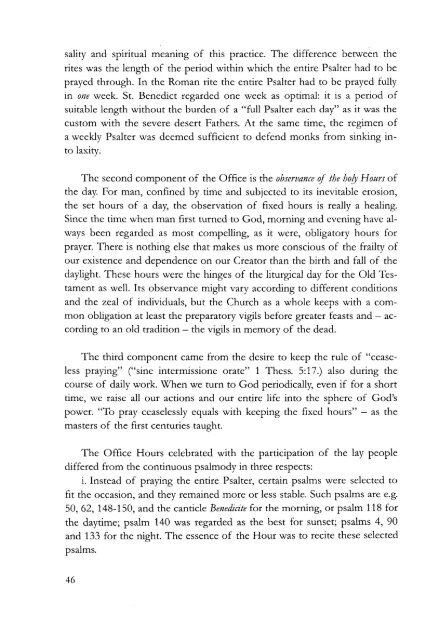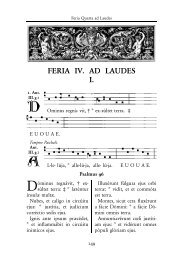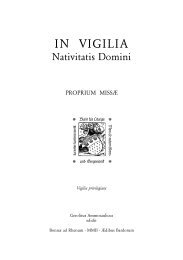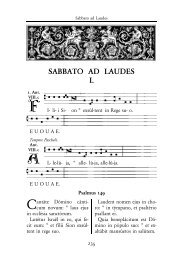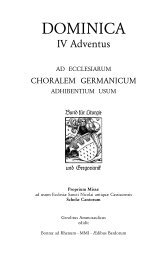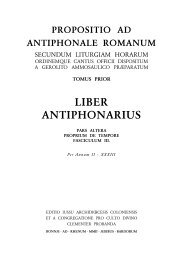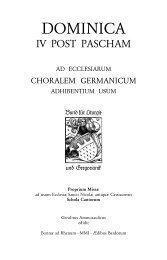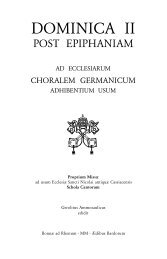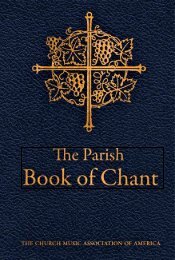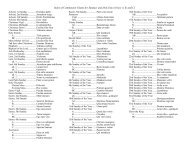The Bugnini-Liturgy and the Reform of the Reform - MusicaSacra
The Bugnini-Liturgy and the Reform of the Reform - MusicaSacra
The Bugnini-Liturgy and the Reform of the Reform - MusicaSacra
You also want an ePaper? Increase the reach of your titles
YUMPU automatically turns print PDFs into web optimized ePapers that Google loves.
sality <strong>and</strong> spiritual meaning <strong>of</strong> this practice. <strong>The</strong> difference between <strong>the</strong><br />
rites was <strong>the</strong> length <strong>of</strong> <strong>the</strong> period within which <strong>the</strong> entire Psalter had to be<br />
prayed through. In <strong>the</strong> Roman rite <strong>the</strong> entire Psalter had to be prayed fully<br />
in one week. St. Benedict regarded one week as optimal: it is a period <strong>of</strong><br />
suitable length without <strong>the</strong> burden <strong>of</strong> a "full Psalter each day" as it was <strong>the</strong><br />
custom with <strong>the</strong> severe desert Fa<strong>the</strong>rs. At <strong>the</strong> same time, <strong>the</strong> regimen <strong>of</strong><br />
a weekly Psalter was deemed sufficient to defend monks from sinking into<br />
laxity.<br />
<strong>The</strong> second component <strong>of</strong> <strong>the</strong> Office is <strong>the</strong> observance <strong>of</strong> <strong>the</strong> holy Hours <strong>of</strong><br />
<strong>the</strong> day. For man, confined by time <strong>and</strong> subjected to its inevitable erosion,<br />
<strong>the</strong> set hours <strong>of</strong> a day, <strong>the</strong> observation <strong>of</strong> fixed hours is really a healing.<br />
Since <strong>the</strong> time when man first turned to God, morning <strong>and</strong> evening have always<br />
been regarded as most compelling, as it were, obligatory hours for<br />
prayer. <strong>The</strong>re is nothing else that makes us more conscious <strong>of</strong> <strong>the</strong> frailty <strong>of</strong><br />
our existence <strong>and</strong> dependence on our Creator than <strong>the</strong> birth <strong>and</strong> fall <strong>of</strong> <strong>the</strong><br />
daylight. <strong>The</strong>se hours were <strong>the</strong> hinges <strong>of</strong> <strong>the</strong> liturgical day for <strong>the</strong> Old Testament<br />
as well. Its observance might vary according to different conditions<br />
<strong>and</strong> <strong>the</strong> zeal <strong>of</strong> individuals, but <strong>the</strong> Church as a whole keeps with a common<br />
obligation at least <strong>the</strong> preparatory vigils before greater feasts <strong>and</strong> — according<br />
to an old tradition - <strong>the</strong> vigils in memory <strong>of</strong> <strong>the</strong> dead.<br />
<strong>The</strong> third component came from <strong>the</strong> desire to keep <strong>the</strong> rule <strong>of</strong> "ceaseless<br />
praying" ("sine intermissione orate" 1 <strong>The</strong>ss. 5:17.) also during <strong>the</strong><br />
course <strong>of</strong> daily work. When we turn to God periodically, even if for a short<br />
time, we raise all our actions <strong>and</strong> our entire life into <strong>the</strong> sphere <strong>of</strong> God's<br />
power. "To pray ceaselessly equals with keeping <strong>the</strong> fixed hours" — as <strong>the</strong><br />
masters <strong>of</strong> <strong>the</strong> first centuries taught.<br />
<strong>The</strong> Office Hours celebrated with <strong>the</strong> participation <strong>of</strong> <strong>the</strong> lay people<br />
differed from <strong>the</strong> continuous psalmody in three respects:<br />
i. Instead <strong>of</strong> praying <strong>the</strong> entire Psalter, certain psalms were selected to<br />
fit <strong>the</strong> occasion, <strong>and</strong> <strong>the</strong>y remained more or less stable. Such psalms are e.g.<br />
50, 62, 148-150, <strong>and</strong> <strong>the</strong> canticle Benedicite for <strong>the</strong> morning, or psalm 118 for<br />
<strong>the</strong> daytime; psalm 140 was regarded as <strong>the</strong> best for sunset; psalms 4, 90<br />
<strong>and</strong> 133 for <strong>the</strong> night. <strong>The</strong> essence <strong>of</strong> <strong>the</strong> Hour was to recite <strong>the</strong>se selected<br />
psalms.<br />
46


